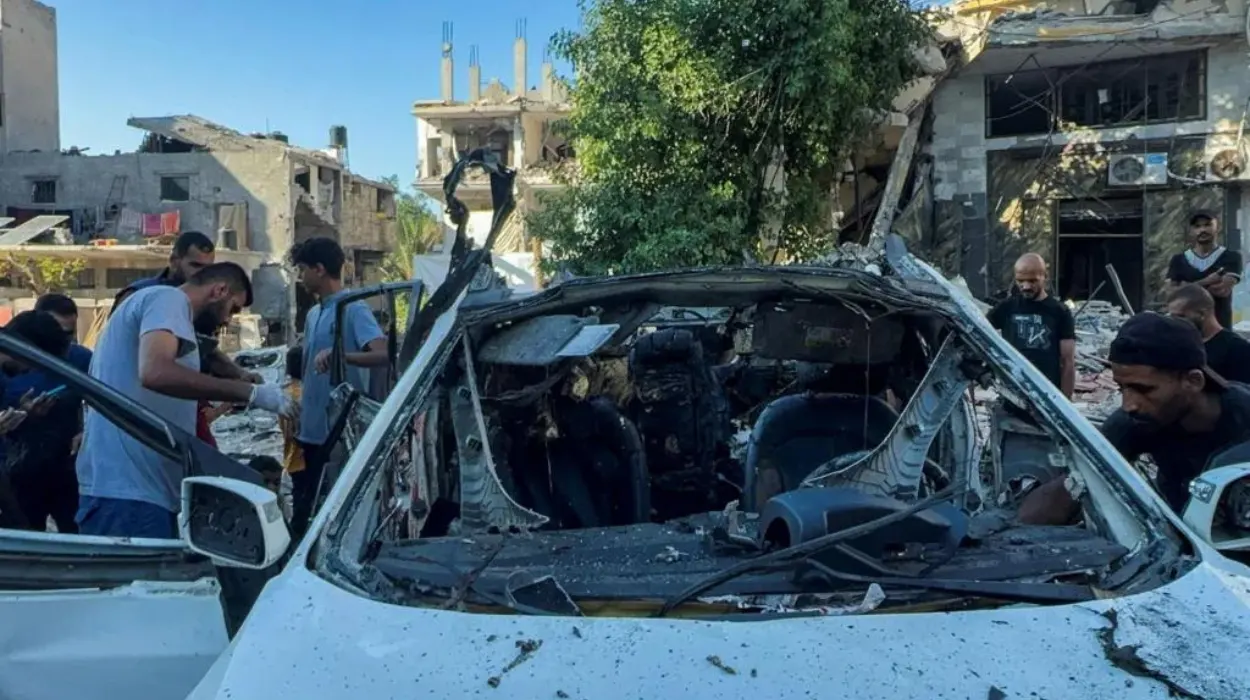Palestine (Transatlantic Today) – Al Jazeera has firmly denied the Israeli military’s assertion that its correspondent, killed in a recent Gaza airstrike, was affiliated with Hamas. The journalist, Ismail al-Ghoul, died in an attack on his car in Gaza City on Wednesday. Alongside him, his cameraman, Rami al-Rifi, and a young bystander, Khalid Shawa, were also killed.
Video footage shared on social media revealed the tragic aftermath of the strike, showing the decapitated body of Ismail al-Ghoul. The Israel Defence Forces (IDF) labeled him as a “Hamas military wing operative and Nukhba terrorist,” claiming he participated in the 7 October attacks. The IDF alleged that al-Ghoul trained operatives on recording operations and publicizing attacks against Israeli forces. However, Rami al-Rifi was not mentioned in the IDF statement.
Al Jazeera and Family Rebut Claims
Al Jazeera has refuted these allegations as “baseless,” emphasizing Israel’s history of fabrications to justify its actions. Al-Ghoul’s brother, Jihad, told the BBC that Ismail was purely a civilian journalist dedicated to depicting the struggles of the Palestinian people in Gaza. Al-Ghoul was a familiar figure on Al Jazeera, a major news source in the region, but one that often faces criticism from Israeli authorities.
According to BBC, The killing of Ismail al-Ghoul has resonated deeply among Palestinians, particularly as they mourn the losses of prominent figures like the late Hamas leader Ismail Haniyeh, who was assassinated in Tehran. During Friday prayers, many Palestinians also remembered those killed closer to home, including al-Ghoul.
Ismail al-Ghoul had covered significant events, such as Israel’s raid on Shifa Hospital in March, where he was briefly detained but released without charge. Al Jazeera stated that his release debunked claims of his involvement with any militant organization. The two journalists were killed while reporting on reactions to Haniyeh’s death, near the Hamas leader’s destroyed house in Shati Camp.
The conflict has seen Israel restrict international journalists from entering Gaza, allowing only limited and controlled visits. Egypt has similarly blocked reporters from entering via the Rafah border crossing. Consequently, networks like the BBC have relied on local Palestinian journalists and freelancers for on-the-ground coverage.
Personal and Professional Losses
Ismail al-Ghoul had been with Al Jazeera since November and endured significant personal losses during the conflict, including the deaths of his father and brother. Fellow cameramen praised al-Rifi’s technical expertise and assistance in their work. Images of Khaled al-Shawa, the young boy killed in the strike, were widely circulated, with his mother urging for him to be remembered by name and not just as a statistic.
Journalists in Gaza have faced severe risks, with many killed or injured in the conflict. In late October, Al Jazeera’s bureau chief, Wael Dahdouh, lost family members in an airstrike while reporting live. Dahdouh himself was later injured, and other Al Jazeera journalists, including Samer Abudaqa and Hamza Dahdouh, were killed in subsequent attacks. Israel has claimed these individuals were members of militant groups, accusations Al Jazeera strongly denies.
The United Nations has stressed the need for journalists’ protection globally and demanded a comprehensive investigation into the killings of journalists in Gaza. The number of journalists murdered since the lethal strikes on Israel by Hamas, which set off the Gaza war, has been reported in a variety of ways. 113 media professionals have perished, according to the Committee to Protect Journalists; 108 of them were Palestinians, three were Lebanese, and two were Israelis.
Al Jazeera continues to face considerable obstacles. In May, the Israeli government decided to ban the channel from broadcasting within the country, citing national security concerns. This ban was extended last month by the Tel Aviv District Court, making the broadcaster’s work in the region even more difficult.


























